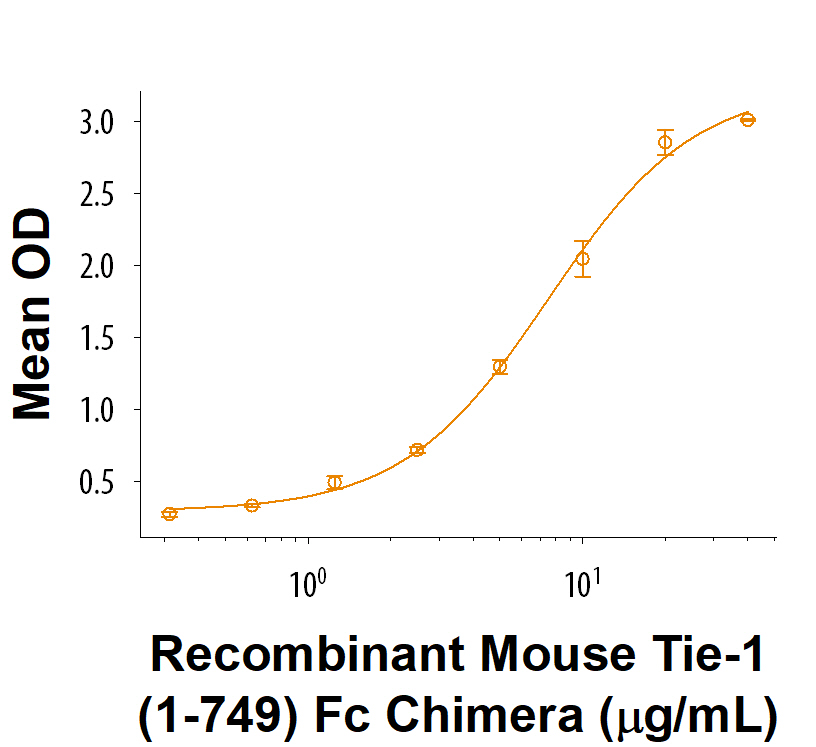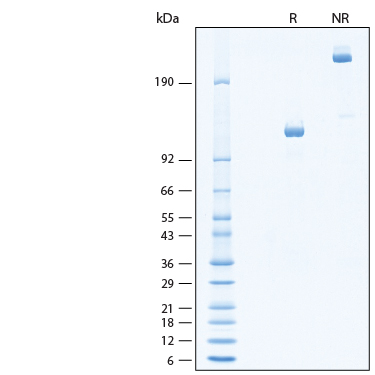Recombinant Mouse Tie-1 (1-749) Fc Chimera Protein, CF Summary
Product Specifications
| Mouse Tie-1 (Ser22-Ala749) Accession # Q06806.3 | IEGRMDP | Mouse IgG2A (Glu98-Lys330) |
| N-terminus | C-terminus | |
Analysis
Product Datasheets
Carrier Free
CF stands for Carrier Free (CF). We typically add Bovine Serum Albumin (BSA) as a carrier protein to our recombinant proteins. Adding a carrier protein enhances protein stability, increases shelf-life, and allows the recombinant protein to be stored at a more dilute concentration. The carrier free version does not contain BSA.
In general, we advise purchasing the recombinant protein with BSA for use in cell or tissue culture, or as an ELISA standard. In contrast, the carrier free protein is recommended for applications, in which the presence of BSA could interfere.
11220-TI
| Formulation | Lyophilized from a 0.2 μm filtered solution in PBS with Trehalose. |
| Reconstitution | Reconstitute at 500 μg/mL in PBS. |
| Shipping | The product is shipped at ambient temperature. Upon receipt, store it immediately at the temperature recommended below. |
| Stability & Storage: | Use a manual defrost freezer and avoid repeated freeze-thaw cycles.
|
Scientific Data
 View Larger
View Larger
When Recombinant Mouse Integrin alpha V beta 3 (7889-AV) is immobilized at 2 µg/mL (100 µL/well), Recombinant Mouse Tie‑1 (1-749) Fc Chimera (Catalog # 11220-TI) binds with an ED50 of 2.00-20.0 μg/mL.
 View Larger
View Larger
2 μg/lane of Recombinant Mouse Tie-1 (1-749) Fc Chimera Protein (Catalog # 11220-TI) was resolved with SDS-PAGE under reducing (R) and non-reducing (NR) conditions and visualized by Coomassie® Blue staining, showing bands at 105-125 kDa and 210-250 kDa, respectively.
Reconstitution Calculator
Background: Tie-1
Tyrosine -protein kinase with immunoglobulin (Ig) like and epidermal growth factor (EGF) like domains 1 (Tie1), along with the closely related Tie2, is a transmembrane, vascular-specific receptor tyrosine kinase (RTKs) involved in angiogenesis, vascular development, and hematopoiesis (1,2). The Tie molecules are characterized by three Ig-like domains, three EGF-like domains, and three fibronectin type III-like repeats in the extracellular domain (ECD) and a split tyrosine kinase domain in the cytoplasmic region (3,4). The ECD of mouse Tie1 shares 89% amino acid sequence identity with human Tie1. Tie1 is expressed in endothelial and some hematopoietic progenitor cells and helps modulate angiopoietin signaling (5). While Tie1 is unable to directly bind any of the angiopoietins, it can modulate Tie2/angiopoietin signaling through Tie1/Tie2 heterodimer formation (6). Upregulation of Tie1 has been found in some leukemia and tumor related endothelial cells and inhibition of Tie1 has been shown to prevent metastasis and is being studied as a target for anti-angiogenesis treatments (7-9).
- Thomas, M. and Augustin, H. (2009) Angiogenesis 12:125.
- Fagiani, E. and Christofori, G. (2013) Cancer Letters 328:1.
- Seegar, T.C.M. et al. (2010). Mol. Cell. 37:643.
- Barton, W.A. et al. (2006). Nat Struc & Molec Biol. 13:524.
- Saharinen, P. et al. (2017) Nat Rev Drug Discov. 16:635.
- Yuan, H.T. et al. (2007) FASEB J. 21:3171.
- Yang, P. et al. (2015). J. Huazhong Univ. Sci. Technol. Med. Sci. 35:615-622.
- D'Amico, G. et al. (2014) J Clin Invest. 124:824.
- Khan, K.A. and Kerbel, R.S. (2020) EMBO molecular medicine 12:e12355.
FAQs
No product specific FAQs exist for this product, however you may
View all Proteins and Enzyme FAQsReviews for Recombinant Mouse Tie-1 (1-749) Fc Chimera Protein, CF
There are currently no reviews for this product. Be the first to review Recombinant Mouse Tie-1 (1-749) Fc Chimera Protein, CF and earn rewards!
Have you used Recombinant Mouse Tie-1 (1-749) Fc Chimera Protein, CF?
Submit a review and receive an Amazon gift card.
$25/€18/£15/$25CAN/¥75 Yuan/¥1250 Yen for a review with an image
$10/€7/£6/$10 CAD/¥70 Yuan/¥1110 Yen for a review without an image


